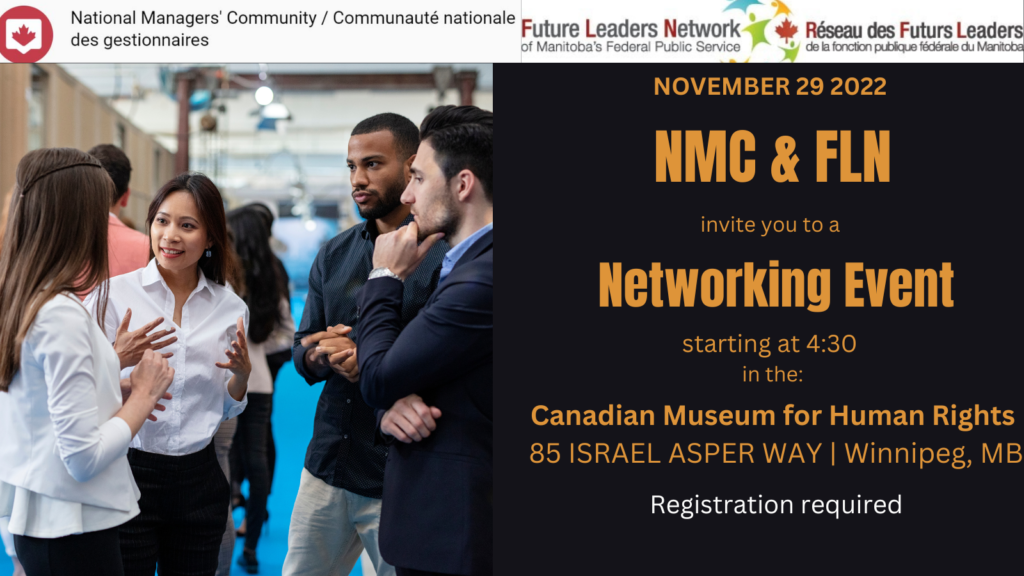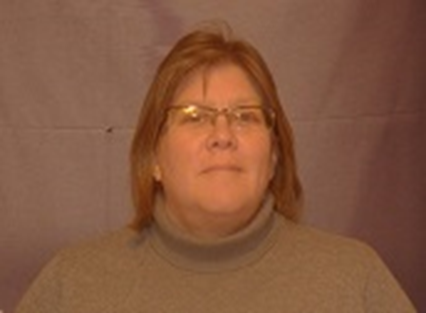Respectful Engagement!
Take advantage of this long-awaited opportunity to network in person with colleagues from other departments and agencies where we will explore the collaborative communication model as well as reflect on what it means to foster a safe and inclusive workplace.
Date and Time
Tuesday, November 29, 2022, from 8:00 AM to 4:00 PM CST
Location and registration
Canadian Museum for Human Rights, 85 Israel Asper Way, Winnipeg, MB
Language
This event will be offered in English only.
To note that due to the pilot nature of the sessions, the regional events will not include simultaneous translation services. Participants will be able to submit their questions in the language of their choice and a moderator will help with translation.
Agenda
8:00 to 9:00
Registration and networking
9:00 to 12:00
Resolving Conflict Effectively for Leaders
½ day session focusing on the Collaborative Communication Model (CCM)
Facilitated by Brandi Wright, BSW, who is a Conflict Management Practitioner, at the Winnipeg Conflict and Complaint Management Services office under the Director General Conflict Solutions and Services of the Chief Professional Conduct and Culture organization for the Department of National Defense.
12:00 to 13:00
Lunch will NOT be provided
13:00 to 15:00
Cultural Safety, Reconciliation and Anti-Indigenous Racism
What it looks like? And how to assess in your organization.
Facilitated by Guest Speaker – Carolyn Laude – KCII Rep
15:00 to 16:00
Round-table discussions with 5-6 EX from MB to continue the points shared and lessons learned.
Mixer
If you would like to attend the mixer organized after the event register here: FLN and NMC Winnipeg Mixer / FLN et CNG 5@7 Winnipeg Tickets, Tue, 29 Nov 2022 at 4:30 PM | Eventbrite

Speakers Bios
Brandi Wright

Brandi Wright is the Acting Senior Practitioner with Department of National Defence Conflict Solutions and Services. She has over 26 years of experience in the field of Alternative Dispute Resolution with 13 of those with the Department of National Defence. She has a Bachelor of Social Work from the University of Manitoba and a Certificate in Mediation from Mediation Services. She has experience in Restorative Justice processes as well as many years focusing on workplace conflicts.
Carolyn Laude

Carolyn Laude has worked on a broad range of complex Indigenous affairs policy and program files at the First Nation, non-profit, post-secondary education, and government sector levels. Over the last few years, she has worked on files associated with the First Nation Oil and Gas Industry, and the topics of Anti-Racism, Reconciliation Competence and Indigenous Innovation, and Diversity and Inclusion touching on Conscious and Unconscious Bias in the workplace. She is presently completing a PhD in Legal Studies at Carleton University.
For her Comprehensive Exam, Carolyn examined the Tsilhqot’in Nation decision to understand how settler-colonial modes of reconciliation account for and/or contradict Indigenous inherent rights and socio-legal ordering on Indigenous land. Moreover, the project studied how Indigenous peoples, academics, policy commentators, the courts and government officials understand and seek reconciliation.
In her PhD work, Carolyn is presently examining whether An Act respecting the United Nations Declaration on the Rights of Indigenous Peoples can protect Indigenous inherent rights (focus on land and sovereignty in relation to resource extraction) through legislation, policies, and practices. Carolyn is exploring whether the tension between distinct lifeworld modes can be resolved. She plans to apply an Indigenous analytical framework to offer a decolonial alternative to the liberalizing of Indigenous inherent rights. One that investigates whether Indigenous ways can create ethical settler-Indigenous spaces and relations that uphold Indigenous rights, ways of knowing and being, equality, and human dignity while addressing systemic racism.
She is regularly asked to speak and has provided training to various federal departments (e.g., CIRNAC, ISC, DFO, Immigration and Citizenship, PCO, ESDC, and NRCan officials – management and staff levels) on a variety of topics, for example: •Building Shared Understanding of Reconciliation and Innovating the Path-Forward.
•Championing Inclusive Diversity in the Workplace – Building Cultural Safety Through Leadership Competencies.
•Systemic Racism.
•Cultural Safety and Indigeneity.
•Brave and Safe Spaces.
•Indigenous Inclusion.
Carolyn holds a Master’s in Legal Studies and a Bachelor of Arts Honours in Political Science with a concentration in Canadian Studies. When asked she also provides subject matter expertise on the topic of reconciliation and has taught a fourth-year undergraduate course on Indigeneity in the City for several years.
Resources
Cultural Safety, Reconciliation and Anti-Indigenous Racism, Facilitated by Guest Speaker – Carolyn Laude – KCII Rep
Materials talked about in the session and during the Ask Me Anything session:
- Systemic Racism (slide 6) – To think about how exclusion operates in our system, we should ask ourselves:
- What about the specific instances of historical and current wrongdoing? How are they linked together?
- What exactly are the assumptions and organizational arrangements that underlie various forms of structural relations of dominance and exclusion?
- Who controls these assumptions and organizational arrangements. How are they communicated? How are they manifested in society’s arenas?
- To what extent are “ordinary” people complicit in this? To what extent do they simply absorb these assumptions and simply take for granted the organizational arrangements?
- How do the answers to these questions play out in different institutions in society and to what extent do they reflect and reinforce each other?
2. Application of a culturally safe intersectional lens is also recommended for analyzing how Indigenous Peoples and employees may experience policies, programs, and initiatives whether internal or external facing. An Indigenous GBA+ lens helps us to recognize and deepen understanding of historic and current discrimination and highlights the intersectional nature of identities.
- The Women of the Metis Nation and the Native Women’s Association of Canada have developed culturally relevant GBA+ tools.
- It also seems that Pauktuutit is in the process of developing an Inuit GBA+ tool and framework utilizing Inuit guiding IQ principles (Inuit Qaujimajatuqangit), which can then support the incorporation of Inuit laws – Maligait and Inuit Qaujimajatuqangit.
3. Jean Teillet Report
Resolving Conflict Effectively for Leaders, facilitated by Brandi Wright, BSW, Conflict Management Practitioner
